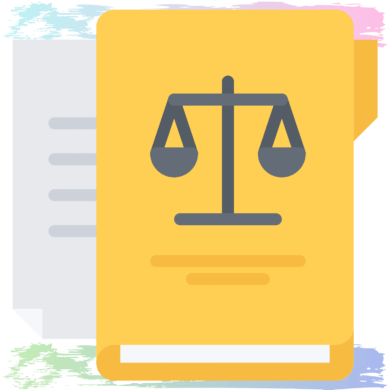Lawyer drafted & approved
Up to date with the latest laws in 2020
Compliant with GDPR, CalOPPA, COPPA, & more

There are 7 key principles in the GDPR they are:
These principles are central to the GDPR. They are not written out as exacting directions to be followed but rather taken as the essence of the regulation. Ensuring that your privacy policy covers and is compliant with these key principles is of extreme importance.


The GDPR sets out the rights of the individual as follows:
What do these rights mean to you? Check out our post on GDPR Compliance and your Privacy Policy for further information.

To be GDPR compliant, an organisation must make sure that the personal data is collected in a lawful and transparent way, it is protected from misuse, maintained in a secure way and that they have appointed someone to be responsible for GDPR compliance.
To ensure your organisation is GDPR compliant the GDPR.EU have compiled a checklist which you can access here: https://gdpr.eu/checklist
The GDPR is applicable to any organisation who operates either inside or outside of the EU who obtains personal data for any reason from residents within the EU. So even if your business is located outside of the EU, you will be required to be GDPR compliant if you offer goods and services to residents of the EU.
This means that almost all organisations should have a GDPR compliant policy in place.
According to the GDPR an organisation must supply a Privacy Policy that is:
Any organisation obtaining personal information from an individual must include the following information in it's Privacy Policy:
Get your GDPR compliant privacy Policy here
CalOPPA applies to any organisation or individual who operates a website or online service and collects personally identifying information from Californian residents. CalOPPA however doesn't apply to entities who store personally identifiable information for a third party.
Under CalOPPA the following are required:
Get your CalOPPA compliant privacy policy here


The Children's Online Privacy Protection Act is a United States federal law that has been in effect since April 21st 2001. Under this law websites must make it evident in their privacy policy whether they collect any personal information from children under 13 years of age. If your website is not targeting children under 13 years of age then it is best you do not collect any age information from your users and add a clause in your privacy Policy which clearly states that your website is not aimed at children under the age of 13.
For your COPPA compliant privacy policy here
A Privacy Policy is not just a legal requirement for your business or e-commerce store it is also a way to ensure you are fulfilling those legal requirements. Having a Privacy Policy also promotes trust with your clients and users as they are aware of how you are managing all aspects of their personal data.
Here is a quick checklist of some highly important components of your Privacy Policy for your business.


Yes even your personal blog is required to have a Privacy Policy. What you will need to include in this policy depends upon what type of data you are collecting from your users and if you are using affiliate links, advertising, if you are selling any products or services and/or providing your users with regular emails.
The following are some things you may want to include in your Privacy Policy:
A privacy policy is a statement or a legal document that is meant to help your users understand what information you collect, why you collect it and how they (your users) can update, manage or delete the information you collect.
Yes, you can use the template on privacyterms.io for free, we sell Lawyer Drafted Privacy Policy, compliant with major international Privacy Laws.
You can include multiple clauses based on what your business’s data collection practices and other operations are related to your user’s privacy.
Your privacy policy should be written in an unambiguous way and should not be hard to understand for your users. You should also disclose any information you collect from your users. See our list of what’s included.
Yes, you a cookie policy clause is included in the privacy policy. Some nations require you to include a cookie policy in your privacy policy. We recommend including this clause.
A Privacy Policy and a Terms and Conditions agreement are both legal documents that are required for any business or website. A Privacy Policy is required by law if you collect and process personal information and a Terms and Conditions agreement is the guidelines for using your site and helps limit legal liability for you. The […]
You know you need a Privacy Policy and you think you also need to be compliant with GDPR. So what are the requirements of a GDPR Privacy Policy? The exact content of your websites Privacy Policy will be determined by the type of business you are running. However all Privacy Policies do require these things […]
GDPR compliance refers to your privacy policy’s compliance with the General Data Protection Regulation (EU) 2016/679. Let’s take a look at what it means for the privacy policy of your business. A Privacy Policy for your website or business is required by law. The purpose of the Privacy Policy is to clearly explain what data […]
Online privacy laws regulate and standardise the storing and using of personally identifiable information of individuals. This information is usually collected by entities like governments, big businesses, organisations or other individuals operating as contractors of sole traders. Let’s take a look at some of the major privacy laws around the globe. and… …be mindful of […]
Online privacy laws regulate and standardise the storing and using of personally identifiable information of individuals. This information is usually collected by entities like governments, big businesses, organisations or other individuals operating as contractors of sole traders. Let’s take a look at some of the major privacy laws around the globe. and… …be mindful of […]
GDPR compliance refers to your privacy policy’s compliance with the General Data Protection Regulation (EU) 2016/679. Let’s take a look at what it means for the privacy policy of your business. A Privacy Policy for your website or business is required by law. The purpose of the Privacy Policy is to clearly explain what data […]
A Privacy Policy and a Terms and Conditions agreement are both legal documents that are required for any business or website. A Privacy Policy is required by law if you collect and process personal information and a Terms and Conditions agreement is the guidelines for using your site and helps limit legal liability for you. The […]